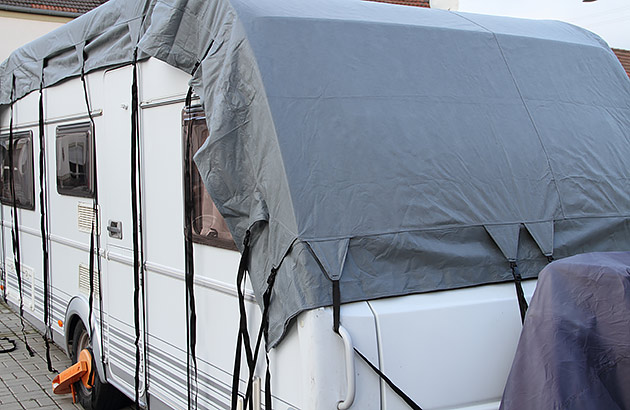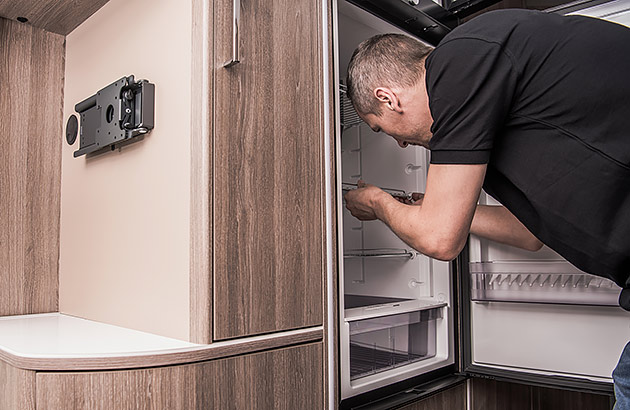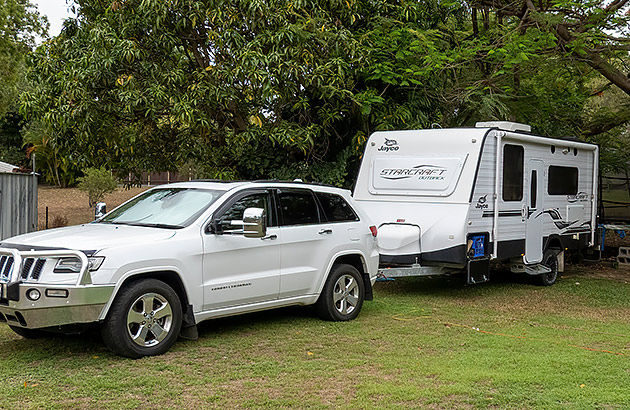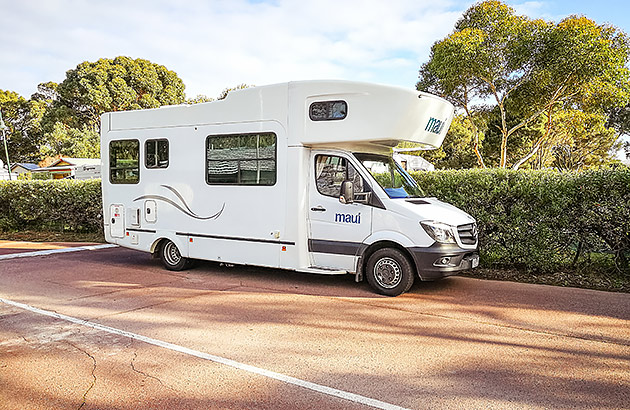By: Brendan Batty
How to correctly store your caravan at home and off-site and where you can and can't park it outside of your property.
Have you ever considered that if you have a vehicle that only gets used on holidays, it can only let you down when you are on holiday? How you store your caravan or motorhome while it's not on holiday can have a very significant effect on how good your caravanning holidays are.
So, how should you park up your caravan or motorhome between trips to ensure that when it's time to head off again, your first stop isn't on the side of the road waiting for help? Or so that everything works when you get to camp, nothing leaks, and your drinks are still cold.
RELATED:
Caravan manufacturing issues »
Where to park your caravan at home
The best place to park your caravan is in a fully enclosed garage, completely protected from the weather. But as most caravans are three metres tall, very few of us can get them in one.
According to Andrew Hoogwerf of The Caravan Shed in Bibra Lake, UV and water damage are two of the biggest issues to overcome when storing your caravan. Anything you can do to protect your caravan from water and UV will help extend its life, and that could be as simple as a caravan cover or as permanent as a carport. "Caravan roofs are especially susceptible to UV damage, and deteriorating seals can lead to water damage," Hoogwerf says.
"The main thing to do is to inspect your caravan regularly, especially when you park it up and before you take it away again. It's much cheaper to repair seals than replace a caravan's ceiling."

How should I prepare my caravan for long-term storage?
Before you park up your caravan long-term, you need to get it ready. Start by giving it a thorough clean, inside and out, especially if you've been travelling in dusty or salty environments. Be careful if you're using a high-pressure hose, as water can be forced past the cladding or into windows and wall joints, leading to rot. Hose from the top down. When you do park it, Hoogwerf recommends curved wheel chocks to prevent flat spots in the tyres.
Inside, clean and dry all the wet areas (kitchen, bathroom and laundry). Remove and replace the dirty bedding and laundry and remove any perishable food.
Flush and empty all the tanks as much as possible, especially grey and blackwater tanks. Remove the toilet cassette, give it a good flush, and clean it with disinfectant- household cleaners are fine for the job.

Make sure all your appliances are off, especially the fridge and freezer. Leave both open so they can dry out and air can circulate. Consider leaving some moisture absorbers around to trap any moisture. Turn off the gas at the bottles and purge all your gas appliances of any residual gas.
Do a check of all your canvas. Roll out your awning to let it dry and ensure any walls or annexe attachments are moisture-free before you pack them away. They can go mouldy in just days, in the right conditions.
Lastly, make sure all the windows and hatches are closed, and close all the blinds to limit the chance of UV damage to the interior.
Where can I park my caravan if I don’t have room at home?
If you don't have room on your property to park a caravan or motorhome, there are plenty of options. Caravan self-storage businesses are growing, in line with caravanning and camping as a pastime. If you are happy to park your caravan outside and don't mind some restriction on when you can access it (usually only daylight hours), you can rent space in large storage yards for around $150 per month around Perth. Usually, these places are gated and have security, but you're responsible for insurance. Renting space undercover often adds $70-100 per month to the price.
There are cheaper options, usually away from the city, and often with less security. Gumtree and Facebook Marketplace are good places to peruse options near you.
Increasingly, some storage yards are offering full-service treatment in line with the growing popularity of peer-to-peer caravan hire. For example you can list your caravan on Camplify, and the storage facility may be able to take care of the handover to your renters. Usually, there's a revenue split. An arrangement like that could help cover storage costs and even help you earn some income while the caravan is idle.
If you holiday to the same spot each year, some caravan parks, especially in regional locations, offer caravan storage.

Can I park my caravan on the street?
There are 138 local council areas in Western Australia, and most of them have their own local parking laws, and the majority has specific caravan rules in at least two of their council bylaws. Generally, the more suburban, the more detailed they are.
Several terms pop up regularly: 'caravan', 'verge' (or nature strip), 'thoroughfare' and 'vehicles'.
A caravan is generally defined as a vehicle built for habitation, including motorhomes, campervans, camper trailers and some boats (boat trailers are often referred to alongside caravans). Whenever the local laws talk about 'vehicles', caravans, motorhomes, campervans and trailers are also included.
All the local laws refer to the Local Government Act, 1995 to define that "a thoroughfare means a road or other thoroughfare and includes structures or other things appurtenant to the thoroughfare that are within its limits, and nothing is prevented from being a thoroughfare only because it is not open at each end;", which roughly translates to, "if you can drive on it and you don't personally own it, it's probably a thoroughfare."
As for a verge, all the local laws refer to Road Traffic Code 2000, which says, "a verge or nature strip means an area between a carriageway and the front boundary of adjacent land, but does not include a path." For householders, roughly translated, it's the patch of grass out the front of your house that you don't own but still have to mow.
Two common laws mention caravans. Below is an example from the City of Armadale's Local Parking Law. While none are identical, many Local Parking Law documents have a similar clause. They go something along the lines of:
No parking of vehicles exposed for sale and in other circumstances:
A person shall not park a vehicle on any portion of a thoroughfare: (a) for the purpose of exposing it for sale; (b) if that vehicle is not licensed under the Road Traffic Act; (c) if that vehicle is a trailer or a caravan unattached to a motor vehicle; or 13 (d) for the purpose of effecting repairs to it, other than the minimum repairs necessary to enable the vehicle to be moved to a place other than a thoroughfare.That essentially rules out parking your caravan or motorhome on the street unless your car is attached. If a motorhome is actually considered a caravan, then a quirk of language may mean you can't park it anywhere on public road infrastructure for any reason because, although it is also a motor vehicle, it isn't attached to one.

The second most common local law to specifically name caravans addresses the parking of caravans on a verge or nature strip. Again, it limits your ability to park a caravan out the front of your residence, although you could park your car there. As an example, Broome City Council states:
Stopping on verge:
(1) A person must not – (a) stop a vehicle other than a bicycle; (b) stop a commercial vehicle or bus, or a trailer or caravan unattached to a motor vehicle; or (c) stop a vehicle during any period when the stopping of vehicles on that verge is prohibited by a sign adjacent and referable to that verge, so that any portion of it is on a verge. (2) Subclause (1)(a) does not apply to the person if he or she is the owner or occupier of the premises adjacent to that verge, or is a person authorised by the occupier of Shire of Broome – Parking and Parking Facilities Local Law 2012 those premises to stop the vehicle so that any portion of it is on the verge. (3) Subclause (1)(b) does not apply to a commercial vehicle when it is being loaded or unloaded with reasonable expedition with goods, merchandise or materials collected from or delivered to the premises adjacent to the portion of the verge on which the commercial vehicle is parked, provided no obstruction is caused to the passage of any vehicle or person using a carriageway or a footpath.
If you had to summarise those laws, essentially, if it's on public land, you probably can't park your caravan there long term. Some councils may turn a blind eye to these laws, but of course, the risk is entirely on you. Fines vary but are usually between $40 and $100.
Some councils have more specific laws around parking caravans, limiting it to certain times of day (usually daylight hours) and for restricted amounts of time (often three or four hours), and usually to get caravans off the streets when they're parked long term, or to prevent free camping in suburban areas.
Others give far more leeway. The Shire of Gnowangerup, for example, allows parking of caravans on the verge as long as you have permission from the owner or occupier of the adjoining property.
To be certain, it’s best to contact the relevant council and ask.
Cover for your caravan
Get ready to travel the open road with RAC. Our caravan insurance includes cover for accident, fire, theft, and contents, plus off-road use.
Disclaimer: Issued by RAC Insurance Pty Limited. Check the PDS & TMD at rac.com.au.
